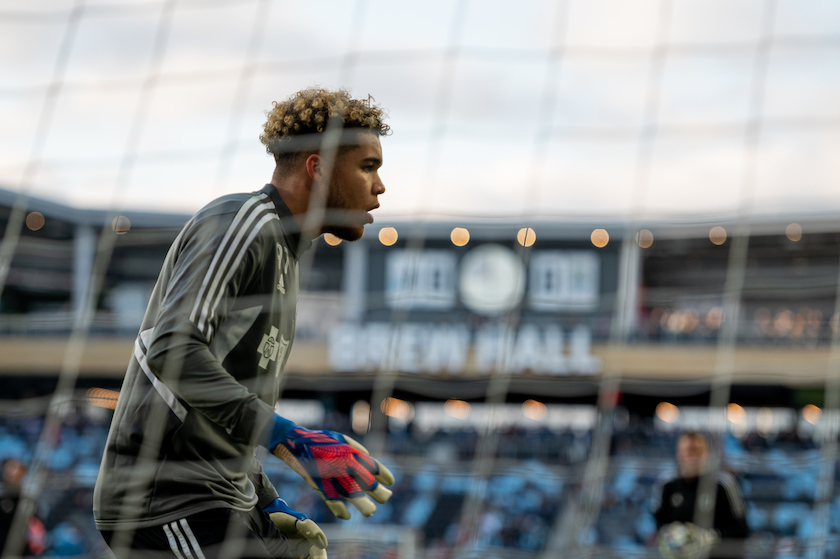There should be a pitch clock in soccer

Major League Baseball’s unmitigated success with its new pitch clock is sweeping the nation. Americans have clock fever! The pitch clock, were it a single person, would be the most popular figure in the history of baseball!
This is hyperbole, but not ridiculous hyperbole. Baseball has managed to cut a half-hour or so out of its usual running time, without changing anything major about the game itself, and all simply by putting an actual clock in view, to help umpires enforce the rules about pace of play that were already on the books.
With this in mind, I think it’s time for the next step: there should be a pitch clock in soccer.
The laws of soccer are pretty vague, on time. All that’s set forth in Law 7, Duration of the Match, is that the game consists of two halves of 45 minutes, that halftime can’t be more than 15 minutes, and that “allowance is made by the referee in each half for all playing time lost in that half.”
Apart from that general rule, it’s mostly up to the referee. At the back of the laws, in the section titled “Practical guidelines for match officials,” there is some advice on stoppage time: “Many stoppages in play are entirely natural (e.g. throw-ins, goal kicks). An allowance is made only when delays are excessive.”
This is not that helpful, and frankly, it makes everybody mad.
There have been at least two controversies in MLS already this year, regarding stoppage time. First, when Vancouver was playing in Minnesota, the Whitecaps scored the tying goal in the eighth minute of an announced six minutes of second-half stoppage time.
The second was just this weekend, when the New England Revolution gave up a 98th-minute goal after five minutes were announced (though there was a long VAR check), leading manager Bruce Arena to call the fourth official “useless” and the VAR system “phoney baloney,” and in general just angle for a fine.
This is to say nothing of the final ten minutes of the game every time the home team is losing by a goal; whenever the visiting goalkeeper gets the ball, for a goal kick or just to punt it, you can guarantee that you’ll hear howls of frustration from the crowd (and the bench) over just how much time-wasting is going on.
Baseball has shown us the way to a solution: put a clock on them. There’s no reason a goal kick should take 90 seconds to be launched; throw a 25-second clock on the keeper, with an indirect free kick for a violation, and you’ll end goal-kick time-wasting immediately. Baseball needed the clock to give the umpires the power to enforce the pace of play; let soccer referees do the same, without needing to resort to a secret clock stoppage that’s added at the end of the half.
You could also use this clock to enforce the rule that’s already in the books, which awards an indirect free kick to the opposing team whenever a goalkeeper holds the ball for more than six seconds as part of normal play. This rule is constantly ignored; I’ve only seen it called once, ever, in the USA-Canada match at the 2012 Olympics, and that required Abby Wambach ostentatiously counting the seconds on her fingers for most of the match before finally managing to shame the referee into calling it the Canadian keeper.
It’d be an even better solution to combine the goalkeeper clock with another change, which is to just have somebody available to stop the actual dang clock, instead of leaving it to the referee to manage stoppage time with his secret wrist clock. The referee is already supposed to be stopping time for VAR checks, substitutions, injuries, when he’s yelling at players, and for “time lost through… wasting time.” Let him just wave his arms in the manner of an American football referee, and stop the actual clock in every one of those situations.
It should also be stopped when a goal is scored, when a penalty is awarded (and restarted when the penalty is taken), and whenever the referee feels like somebody’s taking too long over a restart (with automatic yellow cards for arguing about this).
You can still have stoppage time, left to the referee’s discretion… or just turn it into rugby, where play keeps going at the end of the half, until somebody boots the ball out of bounds (or the ball is otherwise dead).
Regardless of how you do it, though, it’s time to end all the angst about time-wasting and stoppage time in soccer. Baseball, famously the clock-free sport, finally got its act together with the pitch clock, and it’s the best thing that’s happened to the game in a half-century. It’s time for soccer to get on board with this clock revolution, and do the same.